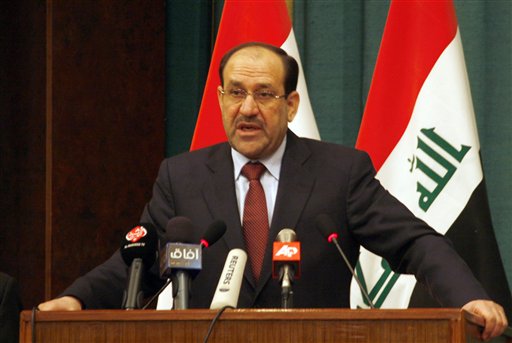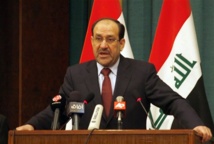Fallujah has been outside government control for days, while parts of Anbar provincial capital Ramadi, farther west, are also held by militants.
It is the first time militants have exercised such open control in major cities since the height of the bloody insurgency that followed the US-led invasion of 2003.
Maliki called on "the people of Fallujah and its tribes to expel the terrorists" so "their areas are not subjected to the danger of armed clashes," state television reported.
He also ordered security forces "not to strike residential areas in Fallujah".
A senior official told AFP on Sunday that Iraqi forces were preparing a major attack on Fallujah.
And ground forces commander Staff General Ali Ghaidan Majeed said the city should "wait for what is coming" -- a reference to an impending assault.
Sheikh Ali al-Hammad, a senior tribal leader from Fallujah, insisted on Monday that Al-Qaeda-linked Islamic State of Iraq and the Levant (ISIL) forces had departed the city, saying it is now held by Sunni tribesmen.
"There is no ISIL in the city," Hammad told AFP by telephone. "They all left."
"The gunmen inside are from the sons of the tribes, and they are here to defend" Fallujah, he said.
A witness said ISIL fighters were still in the city, but had lowered their characteristic black flags to avoid being targeted, and Iraqi officials had previously said ISIL was in control.
However, Fallujah remains outside government control and even if the departure of ISIL militants is confirmed, Baghdad may still seek to retake it.
US to speed up missile deliveries
Washington said it would speed up its deliveries of missiles and surveillance drones to Iraq, though the White House dismissed claims that the fighting was a result of President Barack Obama's decision to withdraw US troops.
The Pentagon said that Washington would accelerate delivery of 100 Hellfire missiles, which were due to be sent to Iraq in the next few months.
Colonel Steven Warren said an additional 10 ScanEagle surveillance drones would also be delivered.
Hellfire missiles, originally designed as an anti-tank weapon, can be fired from helicopters and warplanes while ScanEagle drones are a low-cost three-metre aircraft capable of flying for 24 hours.
Warren reiterated statements from US Secretary of State John Kerry that no US forces would return to Iraq to assist in military operations.
Despite the withdrawal of US forces from Iraq at the end of 2011, the United States remains a key security and defence partner, providing more than $14 billion worth of weapons to Baghdad since 2005.
Kerry said Sunday that while Washington would still provide assistance to Iraqi forces it was "their fight", while Iran's deputy chief of staff, General Mohammad Hejazi, also offered "equipment and advice" to Baghdad.
Fighting in Anbar has reportedly killed more than 200 people in just three days, making it the deadliest violence to hit the province in years.
Echoes of a bloody past
Both Ramadi and Fallujah were insurgent strongholds in the years after 2003, and Fallujah was the target of two major assaults in which US forces saw some of their heaviest fighting since the Vietnam War.
American forces suffered almost one-third of their Iraq dead in Anbar, according to independent website icasualties.org.
They eventually wrested back control of Anbar from militants, with the support of Sunni Arab tribesmen who formed the Sahwa (Awakening) militias, which allied with US troops against Al-Qaeda from late 2006.
But two years after US forces withdrew from the country, Sunni militants have regained strength, bolstered by the war in neighbouring Syria and widespread Sunni Arab anger with Iraq's Shiite-led government.
Fighting erupted in the Ramadi area on December 30, when security forces cleared a year-old protest camp where Sunni Arabs had been demonstrating against what they see as the marginalisation and targeting of their minority community by Baghdad.
The violence spread to Fallujah, and the subsequent withdrawal of security forces from parts of both cities cleared the way for militants to seize control.
Maliki had long sought the closure of the protest camp outside Ramadi, dubbing it a "headquarters for the leadership of Al-Qaeda".
But its removal has caused a sharp decline in the security situation.
ISIL, the latest incarnation of the jihadist group's Iraq affiliate, has made a striking comeback from past defeats, launching numerous attacks in both Iraq and neighbouring Syria last year.
Violence in Iraq in 2013 reached a level not seen since 2008, when the country was just emerging from a brutal period of sectarian killings.
More than 250 people have been killed in the first five days of this month, exceeding the toll for the whole of January last year.
-----------------------------------------------------
It is the first time militants have exercised such open control in major cities since the height of the bloody insurgency that followed the US-led invasion of 2003.
Maliki called on "the people of Fallujah and its tribes to expel the terrorists" so "their areas are not subjected to the danger of armed clashes," state television reported.
He also ordered security forces "not to strike residential areas in Fallujah".
A senior official told AFP on Sunday that Iraqi forces were preparing a major attack on Fallujah.
And ground forces commander Staff General Ali Ghaidan Majeed said the city should "wait for what is coming" -- a reference to an impending assault.
Sheikh Ali al-Hammad, a senior tribal leader from Fallujah, insisted on Monday that Al-Qaeda-linked Islamic State of Iraq and the Levant (ISIL) forces had departed the city, saying it is now held by Sunni tribesmen.
"There is no ISIL in the city," Hammad told AFP by telephone. "They all left."
"The gunmen inside are from the sons of the tribes, and they are here to defend" Fallujah, he said.
A witness said ISIL fighters were still in the city, but had lowered their characteristic black flags to avoid being targeted, and Iraqi officials had previously said ISIL was in control.
However, Fallujah remains outside government control and even if the departure of ISIL militants is confirmed, Baghdad may still seek to retake it.
US to speed up missile deliveries
Washington said it would speed up its deliveries of missiles and surveillance drones to Iraq, though the White House dismissed claims that the fighting was a result of President Barack Obama's decision to withdraw US troops.
The Pentagon said that Washington would accelerate delivery of 100 Hellfire missiles, which were due to be sent to Iraq in the next few months.
Colonel Steven Warren said an additional 10 ScanEagle surveillance drones would also be delivered.
Hellfire missiles, originally designed as an anti-tank weapon, can be fired from helicopters and warplanes while ScanEagle drones are a low-cost three-metre aircraft capable of flying for 24 hours.
Warren reiterated statements from US Secretary of State John Kerry that no US forces would return to Iraq to assist in military operations.
Despite the withdrawal of US forces from Iraq at the end of 2011, the United States remains a key security and defence partner, providing more than $14 billion worth of weapons to Baghdad since 2005.
Kerry said Sunday that while Washington would still provide assistance to Iraqi forces it was "their fight", while Iran's deputy chief of staff, General Mohammad Hejazi, also offered "equipment and advice" to Baghdad.
Fighting in Anbar has reportedly killed more than 200 people in just three days, making it the deadliest violence to hit the province in years.
Echoes of a bloody past
Both Ramadi and Fallujah were insurgent strongholds in the years after 2003, and Fallujah was the target of two major assaults in which US forces saw some of their heaviest fighting since the Vietnam War.
American forces suffered almost one-third of their Iraq dead in Anbar, according to independent website icasualties.org.
They eventually wrested back control of Anbar from militants, with the support of Sunni Arab tribesmen who formed the Sahwa (Awakening) militias, which allied with US troops against Al-Qaeda from late 2006.
But two years after US forces withdrew from the country, Sunni militants have regained strength, bolstered by the war in neighbouring Syria and widespread Sunni Arab anger with Iraq's Shiite-led government.
Fighting erupted in the Ramadi area on December 30, when security forces cleared a year-old protest camp where Sunni Arabs had been demonstrating against what they see as the marginalisation and targeting of their minority community by Baghdad.
The violence spread to Fallujah, and the subsequent withdrawal of security forces from parts of both cities cleared the way for militants to seize control.
Maliki had long sought the closure of the protest camp outside Ramadi, dubbing it a "headquarters for the leadership of Al-Qaeda".
But its removal has caused a sharp decline in the security situation.
ISIL, the latest incarnation of the jihadist group's Iraq affiliate, has made a striking comeback from past defeats, launching numerous attacks in both Iraq and neighbouring Syria last year.
Violence in Iraq in 2013 reached a level not seen since 2008, when the country was just emerging from a brutal period of sectarian killings.
More than 250 people have been killed in the first five days of this month, exceeding the toll for the whole of January last year.
-----------------------------------------------------









 Home
Home Politics
Politics











